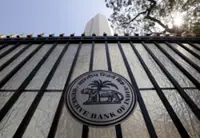
FILE PHOTO: Indian Prime Minister Narendra Modi gestures, at the Bharatiya Janata Party (BJP) headquarters in New Delhi, India, June 4, 2024. REUTERS/Adnan Abidi/File Photo
NEW DELHI (Reuters): Indian Prime Minister Narendra Modi's National Democratic Alliance formally presented its claim on Friday to form a government, as Modi promised that his new coalition of 15 parties would strive for unanimity and emerge successful.
NDA leaders met President Droupadi Murmu and submitted the claim of the alliance, led by Modi's Bharatiya Janata Party, to run the world's most populous nation for the next five years, TV channels and a source in the President's office said.
Murmu was expected to formally invite Modi to form a government later on Friday and the swearing-in would be set for Sunday evening, they said, making him prime minister for a historic third consecutive term.
It is the first time in a decade that the BJP - which won majorities outright in 2014 and 2019 - has needed the support of regional parties to form the government, a shift that initially spooked markets and worries analysts about policy certainty and fiscal discipline.
"It is my good fortune that all of you from NDA have chosen me to lead," Modi said after NDA lawmakers voted unanimously for him to become the leader at the alliance's first meeting after the June 4 vote count and declaration of results.
"No alliance has ever been as successful as the NDA," he said, after lawmakers and senior leaders thumped tables and applauded, with some standing and chanting "Modi, Modi!" in the central hall of the old parliament building.
"We have won the majority... but to run the country it is unanimity that is crucial...we will strive for unanimity," he said, in an sign of the change in style coalition government may force on a leader used to ruling with a strong hand.
The new government would, among others, focus on raising savings of the middle class and improve the quality of their lives as the "middle class is the driving force of the country", Modi added.
NDA LEADERS VOW TO STICK AROUND
Key NDA leaders - whose support has wavered in the past as they hopped in and out of alliances - praised Modi and expressed confidence in his leadership.
"I am confident that whatever is left he will now complete it. We will be with him at every step," said Nitish Kumar, chief minister of the eastern state of Bihar whose Janata Dal (United) party is the third largest in the NDA with 12 lawmakers.
Indian media said both Kumar's party and the Telugu Desam Party, the second largest with 16 lawmakers, are eyeing the post of the speaker in the lower house, while BJP itself is expected to retain four key ministries - foreign affairs, defence, home and finance.
The Janata Dal (United) also wants the new government to review a military recruitment system introduced in 2022 under which young men and women are enlisted for a four-year tenure at non-officer ranks, with only a quarter retained for longer periods.
Previously, soldiers were recruited by the army, navy and air force separately and typically entered service for up to 17 years for the lowest ranks.
The shorter tenure caused concern among potential recruits and led to riots in some parts of the country as it was seen as hurting employment prospects.
A lack of jobs, besides rising prices and falling incomes, were key issues in the election and led voters to rein in support for Modi, according to a post-election survey.
The coalition negotiations are a throwback to an era before 2014, when Modi swept to power with an outright majority for his BJP.
(Reporting by Tanvi Mehta, Sarita Chaganti Singh, Sakshi Dayal, Shivam Patel and Nigam Prusty; Writing by YP Rajesh; Editing by Alex Richardson) - Reuters











































